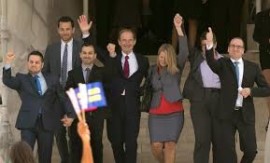
On June 26, 2013, the U.S. Supreme Court issued their much anticipated decisions regarding the constitutionality of DOMA and Prop. 8. The Windsor decision, regarding DOMA, is addressed in the previous blog post. The Hollingsworth decision, regarding Prop. 8, is addressed below. Hollingsworth v. Perry, Prop. 8 After the two couples challenging the constitutionality of Prop. 8 won in District Court, the State of California declined to appeal the ruling. The proponents of Prop. 8 responsible for getting it on the ballot through the initiative process stepped in to appeal. When the Supreme Court granted certiorari, it specifically asked the parties to address whether the proponents of Prop. 8 had standing to bring the appeal. In general terms, standing requires the party to have a specific legal or tangible harm that the court can remedy. In a 5-4 decision written by Chief Justice Roberts, the Supreme Court dismissed the case based on its finding that the proponents of Prop. 8 did not have proper legal standing to appeal the lower court ruling. Proponents had argued that their participation in California’s initiative process in getting Prop. 8 on the ballot gave them a unique interest. However, the Court disagreed, explaining that once Prop. 8 was approved, those who were involved in getting it on the ballot did not have any specialized interest in the law that was distinguishable beyond that of any other California citizen. “No matter how deeply committed petitioners may be to upholding Proposition 8 or how zealous their advocacy, that is not a ‘particularized interest’ sufficient to create [a basis for legal standing] … We have never before upheld the standing of a private party to defend the constitutionality of a state statute when state officials have chosen not to do so. We decline to do so for the first time here.” Based on this ruling, the Ninth Circuit opinion is vacated and the district court ruling remains in place. The practical effect of this decision is that Prop. 8 is history, mostly. The truth is that technically, a district court can only make rulings that apply to the parties before it, rather than statewide. Thus, the district court ruling could only apply to the two couples who challenged Prop 8 in court. However, following the Supreme Court’s ruling, California Governor Jerry Brown directed state officials to begin issuing same-sex marriage licenses as soon as the Ninth Circuit lifts the previous stay on those marriages. Though it’s impossible to say for sure how long it will take, same-sex marriages will likely begin again in California in approximately thirty days from the date of the Supreme Court’s ruling. Read the opinion in its entirety here.
